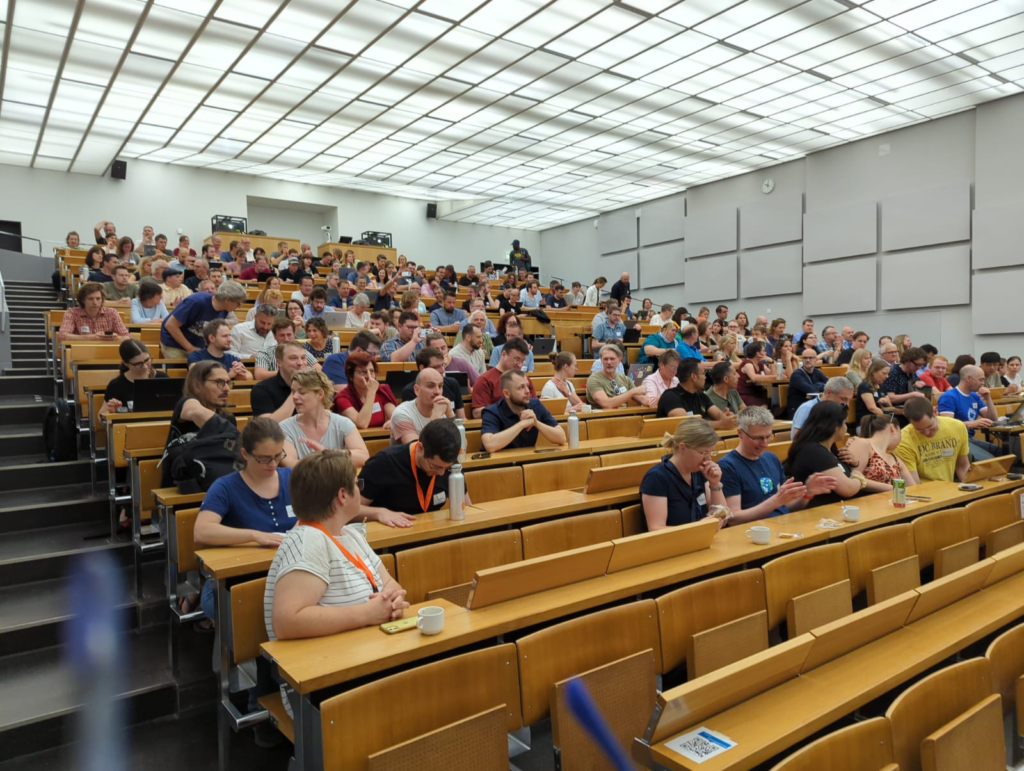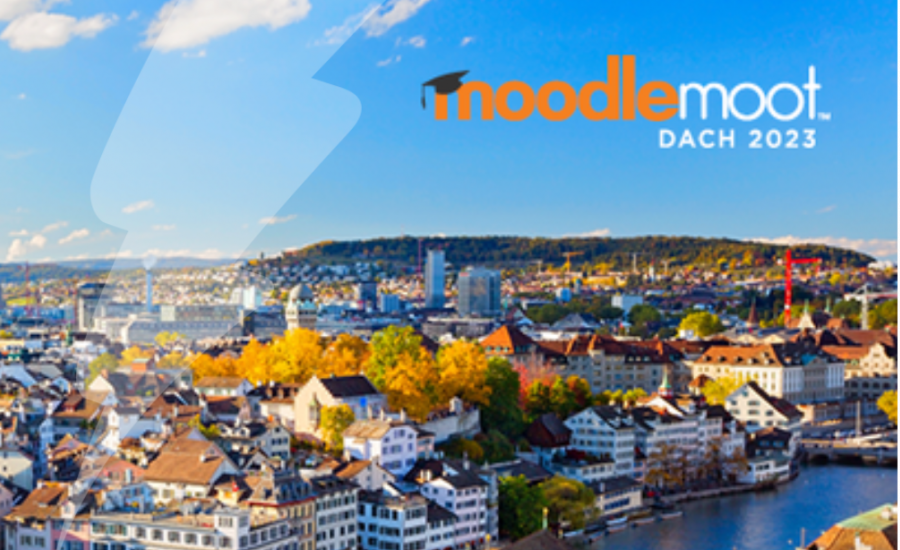MoodleDACH23 in Zurich was my first face-to-face conference since the pandemic. Online is OK, but it was a delight to be in the same room as the attendees. There is no cost to attend and you don’t need to speak German. However, it was a great illustration of the huge amount of contributions that are being made to Moodle by the German-speaking world. This may be driven partly by how seriously they take privacy and Moodle makes it easier to have total control over your learning technology stack.
The unconference

MoodleDACH 2023
MoodleDach is an “unconference”, where the schedule is decided by the attendees. There are “pitching sessions” where people present their ideas and people vote on the one they want to be involved in. It is a bit like Wikipedia, in theory, it shouldn’t work, but in practice it is excellent. MoodleDACH is divided into Dev (developer) Camp and Bar Camp each lasting two days.
Dev and Bar Camp
Dev Camp is about writing Moodle code and Bar Camp is about talking about Moodle, typically by some people with expert-level knowledge. This year there were around 60 people attending the Dev camp with experience ranging from a decade or more to less than six months. In fact, Moodle core contributor David Mudrak said at the 2019 MoodleDach
“One doesn’t need to be a developer to actively participate in DevCamp. We have seen valuable input from administrators, designers and teachers as well”
David Mudrak
The pitches for Dev camp sessions were as wide and varied, ranging from Theme improvements, question import changes and the project I worked on which was to port the Atto Cloze editor to the new TinyMCE editor. I was rather excited by this as the Atto editor will be removed at some point and I have plenty of ideas for new editor plugins. Creating a new plugin for a new editor is not a trivial task but significant progress was made at dev camp.
In the two weeks since MoodleDach, the team has continued collaborating on the plugin and should soon be ready for the plugins database. For me, the prize was not completed plugins but education, collaboration and new friendships. The atmosphere was a combination of the gentle buzz of intense concentration, quiet conversations, tapping on keyboards, frowns and occasionally gasps of pleasure when some problem was overcome and code was committed and merged.
I may have given the impression that MootDACH was a total shoe-staring geek fest. In reality, it was very social, but in the spirit of an unconference, the social events were very much self-organisation with general directions… There was a barbeque on Wednesday evening and Thursday evening’s event was “informal and self-organised” by the lake.
Zurich is a very affluent city and there were times when it felt like being an extra in a glossy movie populated by very glamorous people. I was left with a memory of lying on the grass chatting with people who are so very knowledgeable and passionate about Moodle.
The tempo changes for Bar camp, partly because the numbers attending jump up to 170 and it includes more non-developers. I spend my life dealing with developers and it is a pleasure to have contact with people who use Moodle “in anger”.
STACK quiz
The STACK quiz question type was a thread running through both the Dev camp and Bar camp. STACK is almost certainly the most powerful maths question type in existence and we were honoured with its creator Professor Chris Sangwin and co-maintainer Tim Hunt who is also the main maintainer of the Moodle Quiz engine. They both have PhDs in maths-related subjects and have been involved in the project for many many years.
Some of the STACK sessions were, what is STACK? summative assessment with STACK using STACK for non-maths short answers. This intrigued me as it allows for variations on the correct answer and uses mathematical calculations on how close the response is to the correct answer. The STACK question type is widely used in Universities, but I came away believing it should be the go-to tool wherever maths is taught.
One of the intriguing things about the short answer session was that the STACK creator Chris Sangwin had been reluctant to add the feature that made it possible. Eventually, he did implement it and in hindsight appreciated that it was the right thing to do
Tim Hunt (quiz maintainer) gave a presentation on some of the recent and upcoming changes to the question bank which has had significant changes since Moodle 3.9. Some of this work is being done by Catalyst’s own Mark Johnson and so there is close cooperation in this important area.
The highlight for me was when Tim introduced a new Crossword question type available now from the plugins database. My Gapfill question type can be used for Crosswords but this question type is dedicated to the purpose and should be excellent as a little distraction or as part of formative assessment.
In summary
It has been one of the most inspiring and stimulating events I have ever been to. It feels like there will be ripples out over the years both in the personal connections and the code created, some of which will be on systems used by millions of people.
I got to meet people I have known online for many years but never met face to face. I met new people I will be collaborating with in the future. I really really hope to go to MootDACH24 which is due to be held next year in Vienna.

